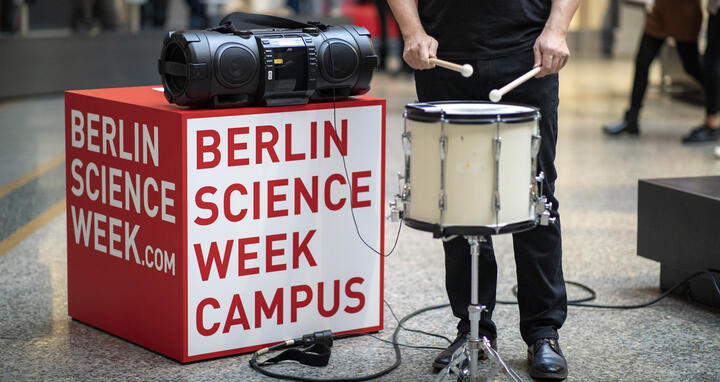Artificial intelligence for the medicine of tomorrow
A wide range of speakers from academia to start-ups and from medicine to science will have only three minutes to present their idea, project or product. For the first time, the audience will choose the most entertaining pitch from among all speakers. A jury composed of scientists will select the best scientific pitch. Due to the coronavirus pandemic, the entire conference is being held online.
Modern molecular biological methods generate such incredible amounts of data that the human brain can no longer process – much less analyze – all of the data. We need artificial intelligence for this.
The program is divided into three sessions: AI and Basic Medical Research, AI and Decision-Making in Medicine, and AI and SARS-CoV-2/COVID-19 Research. “Modern molecular biological methods generate such incredible amounts of data that the human brain can no longer process – much less analyze – all of the data. We need artificial intelligence for this,” says Dr. Roland Schwarz, head of the Evolutionary and Cancer Genomics Lab at the Max Delbrück Center for Molecular Medicine in the Helmholtz Association (MDC) and chair of the first session. The pitches will deal with the use of AI in areas such as genomic sequence analysis, cancer research and sepsis prognosis prediction.
Petra Ritter, BIH Johanna Quandt Professor for Brain Simulation at the BIH and Charité, chairs the second session on decision-making in medicine. “It’s often not easy to decide which therapy is right for which patient, especially when you have to take into account a whole host of factors. This is precisely where artificial intelligence can help, because it can analyze many things at once.” This session will present advances in AI that enable smartphones to detect heart failure, monitor high-risk pregnancies, or evaluate X-rays of tuberculosis patients in rural South Africa.
AI is also helping with COVID-19 research
The third and final session looks at how artificial intelligence is being used to advance research into the novel coronavirus. “AI helps us to understand how the virus spreads in the population, to pull together the many different data from research into the SARS-CoV-2 virus and thus to draw conclusions from the findings as quickly as possible regarding the treatment of COVID-19 patients,” says Professor Sylvia Thun, who is Director of eHealth and Interoperability at the BIH and also Scientific Director of this year’s Future Medicine Science Match.
Q&A session with Federal Research Minister Anja Karliczek
Federal Research Minister Anja Karliczek will answer questions about the German government’s AI strategy in a Q&A session. The keynote lecture will be given by Pawel Swieboda, Director of the Human Brain Project, which is dedicated to using computers and artificial intelligence to increase our understanding of the human brain. Swieboda is also Founding Director of EBRAINS, a brand-new European research infrastructure that facilitates seamless collaboration between scientists and technology experts in order to help advance neuroscience, computer science and neurology.
The conference will also feature welcoming remarks by Professor Christopher Baum, Chief Executive Officer of the BIH; Thomas Jarzombek, Commissioner for the Digital Industry and Start-ups at the Federal Economic Affairs Ministry; and Mathias Müller von Blumencron, Chief Editor of the Tagesspiegel. Future Medicine 2020 is the fifth edition of the conference, which the BIH and the Tagesspiegel organize in collaboration with Charité – Universitätsmedizin Berlin and the Max Delbrück Center for Molecular Medicine in the Helmholtz Association (MDC). It is held annually on November 7 as part of Berlin Science Week.
CME training for physicians offered for the first time
In the run-up to the Future Medicine Science Match, there will also be an online CME training event for physicians on artificial intelligence applications in translational medicine. It will introduce the basic principles of AI and machine learning and give some examples of possible medical applications. BIH Professor Petra Ritter will explain in the first lecture how patients’ brain processes can be simulated using AI, thus enabling the development of new therapeutic approaches. The second lecture by Professor Kerstin Ritter will focus on so-called deep learning processes, which are already being successfully used in medical (neuro)imaging. In the third lecture Dr. Marcel Naik will present models for predicting acute renal failure, before Professor Andrea Volkamer concludes the program by discussing how machine learning procedures can be helpful in early drug development. All speakers are from Charité – Universitätsmedizin Berlin. BIH Professor Sylvia Thun also serves as the scientific director for the CME event.
Media representatives are invited to participate in the conference:
Future Medicine Science Match 2020
Saturday, November 7, 2020
Opening of the conference: 1:00 p.m.
End of the conference: approx. 4:30 p.m.
Or apply for accreditation by contacting:
Dr. Stefanie Seltmann
Head of Communication
Berlin Institute of Health (BIH)
Interviews can be arranged with the participating scientists.
The conference program can be found here.
Find the original press release on the BIH website.
Weitere Informationen
- Website von "Future Medicine Science Match"
- Das Berlin Institute of Health
- Das MDC bei der Berlin Science Week
- Link zur Veranstaltung
Contact:
Dr. Stefanie Seltmann
Leiterin Kommunikation & Marketing
Berlin Institute of Health
+49 (0) 30 450 543019
s.seltmann@bihealth.de
Jutta Kramm
Leiterin Abteilung Kommunikation
Max-Delbrück-Centrum für Molekulare Medizin in der Helmholtz-Gemeinschaft (MDC)
+49-30-9406-2140
jutta.kramm@mdc-berlin.de oder presse@mdc-berlin.de





